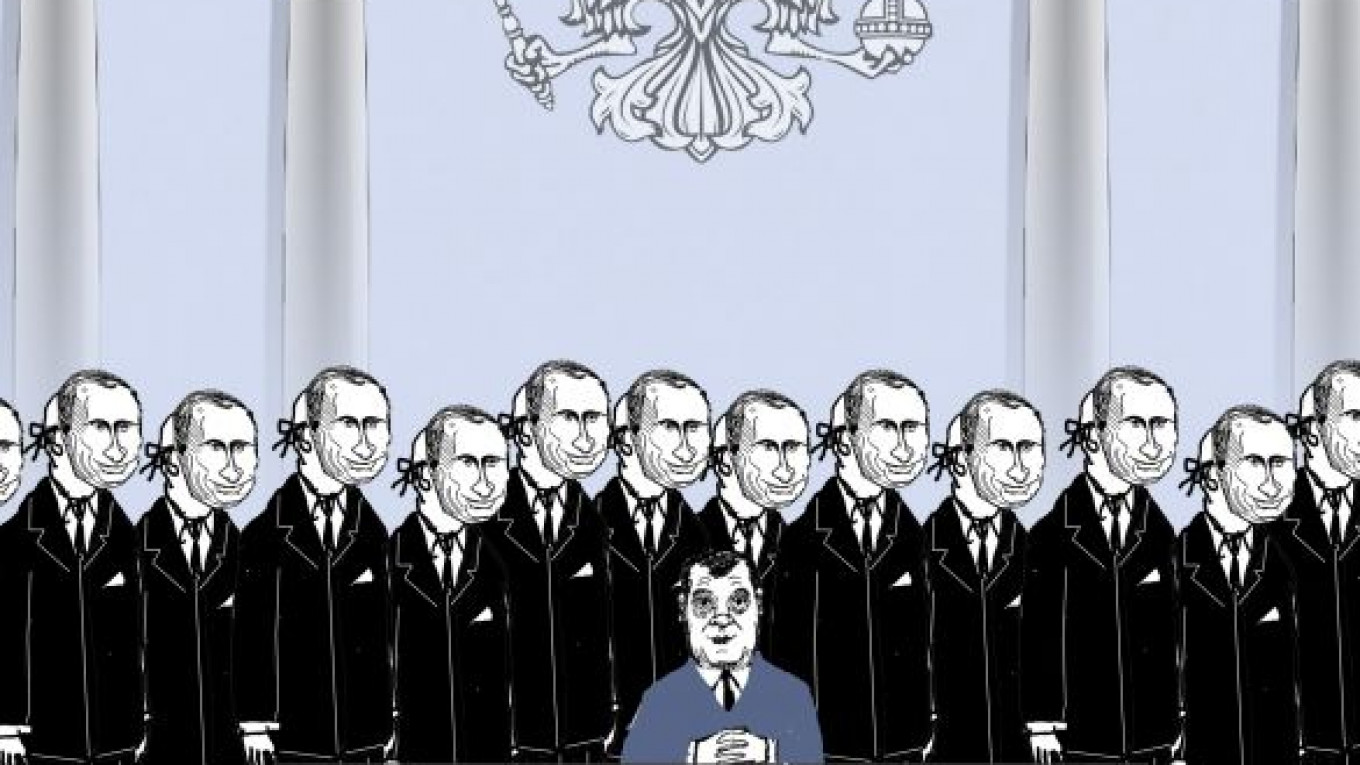Were this 2008 and not 2012 — and had Dmitry Medvedev been named prime minister without having first served a full term as president — then the composition of his new government might have created a generally positive impression. The argument can be made that, with Igor Sechin and Viktor Zubkov gone, the new government is weighted more heavily in favor of liberals than siloviki. The only remaining first deputy prime minister is Igor Shuvalov, widely considered to be progressive and liberal, and who speaks so eloquently — in both Russian and English — at various international forums about improving the investment climate in Russia.
But four years ago, Medvedev made the most memorable statement of his political career when he said that "freedom is better than a lack of freedom." He then wrote an inspirational article titled "Go, Russia!" and spoke repeatedly about rule of law. In short, he raised people's hopes that political change, reforms, breakthroughs in modernization and the end of corruption were imminent, that new people would come to power and a fresh gust of wind would fill the sails of the ship of state and lead it to brighter horizons. Those hopes were not fulfilled during his four years as president. For that reason, Medvedev's not-so-new, Putin-approved government does not inspire any hope either. Nobody anticipates that this particular collection of individuals will work any miracles, and even the word "modernization" is no longer in vogue in political circles.
In presenting his new Cabinet to President Vladimir Putin, Medvedev boasted that three-fourths were new appointments. Technically, that is true, yet all but three of them are either former deputy ministers or Kremlin officials. They are more like body doubles of the previous government.
The group of ministers directly answerable to the president underwent the fewest changes. As predicted, former Moscow police chief Vladimir Kolokoltsev replaced the much-discredited Interior Minister Rashid Nurgaliyev. The Moscow police force might be a little better organized than those in other regions, but not so much as to expect that Kolokoltsev will achieve any decisive successes in police reforms.
Apparently, Putin has long-term plans for Dmitry Rogozin, who has been appointed deputy prime minister in charge of overseeing the military-industrial complex. The leaders chose not to replace Defense Minister Anatoly Serdyukov, even though he is unpopular among the military. Putin considers Serdyukov the best available candidate for carrying out the assigned task of re-equipping and modernizing the army.
Many were delighted by the fact that the new health minister, Veronika Skvortsova — unlike her predecessor, Tatyana Golikova — is a fifth-generation physician. But Skvortsova was previously Golikova's deputy minister and seems intent upon continuing the same course. The removal of Agriculture Minister Yelena Skrynnik was also strange. Skrynnik was successful and effective in that post, and the agricultural sector is booming. But she had a strong personality and was not afraid to protest openly, even to Putin. Apparently, Medvedev simply did not want such an outspoken person in his Cabinet. Professionalism in government has all too often taken a back seat to blind obedience.
Putin will also closely manage the Finance Ministry and personally insisted that Finance Minister Anton Siluanov remain at his post. Siluanov was recommended by his predecessor, Alexei Kudrin, who quarreled with Medvedev. It is noteworthy that Putin made the Federal Financial Monitoring Service directly answerable to him on the same day that the new Cabinet was named.
Former presidential economic adviser Arkady Dvorkovich became a deputy prime minister, but what more can he achieve in that role than he had tried and failed to achieve in his previous role? And how much has the investment climate improved in Russia during the four years that Shuvalov has served as first deputy prime minister?
The new economic development minister, Andrei Belousov, was previously a deputy at the same ministry and often put forward very progressive economic ideas. The only problem is, where are all those ideas now?
Perhaps all these new ideas and proposals will find expression through Medvedev's Open Government, and if they do not find any practical application, they will at least be good for humoring the public. There is even a special minister for relations with this Open Government, Mikhail Abyzov. This indicates that PR and putting the right spin on the work of the government is being given greater attention than usual.
But the government has little to do other than create PR. After all, everybody knows that the most important decisions will be made by Putin and his administration, not Medvedev's Cabinet.
Georgy Bovt is a political analyst.
A Message from The Moscow Times:
Dear readers,
We are facing unprecedented challenges. Russia's Prosecutor General's Office has designated The Moscow Times as an "undesirable" organization, criminalizing our work and putting our staff at risk of prosecution. This follows our earlier unjust labeling as a "foreign agent."
These actions are direct attempts to silence independent journalism in Russia. The authorities claim our work "discredits the decisions of the Russian leadership." We see things differently: we strive to provide accurate, unbiased reporting on Russia.
We, the journalists of The Moscow Times, refuse to be silenced. But to continue our work, we need your help.
Your support, no matter how small, makes a world of difference. If you can, please support us monthly starting from just $2. It's quick to set up, and every contribution makes a significant impact.
By supporting The Moscow Times, you're defending open, independent journalism in the face of repression. Thank you for standing with us.
Remind me later.







